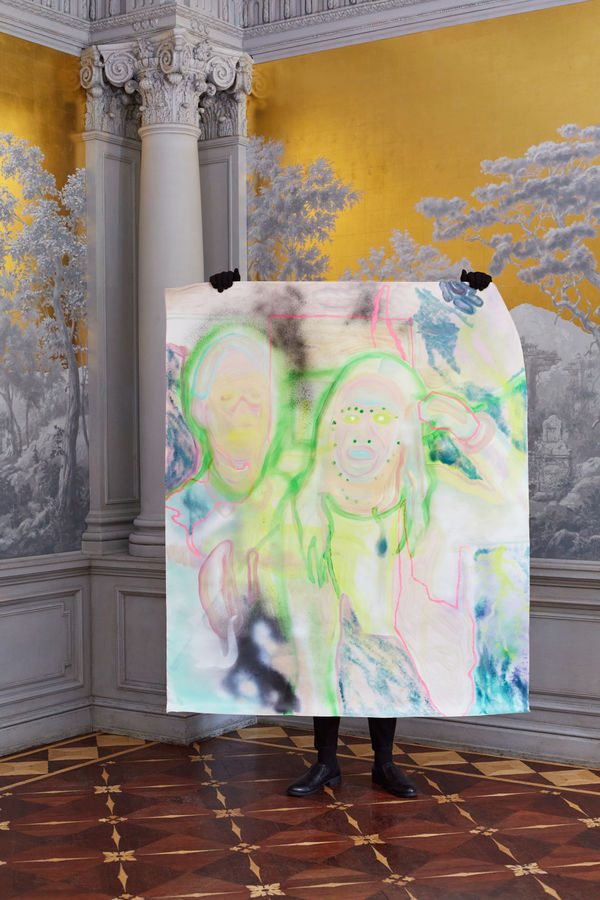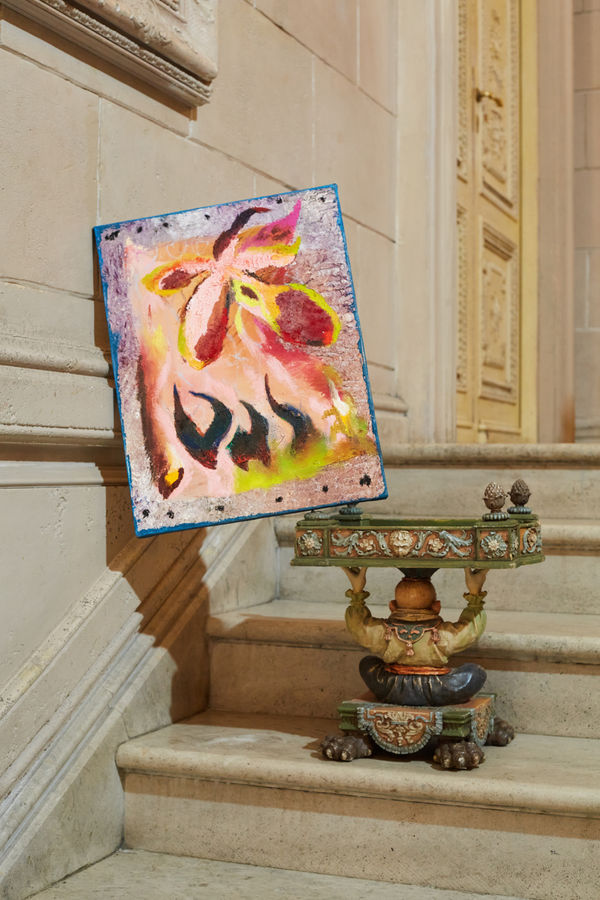Curator: Alexander Burenkov
Photo: Monika Dubinkaite
Camera: Liza Popova
Place: "Turandot" Restaurant Moscow
-
The time of lockdown was not only a ‘back to reality’ period of experiencing radical loneliness and being in the privacy of one’s own mind but also the time of manifestation of magical powers and inexplicable irrational phenomena. Conspiracy theories, new mysticism, fascination with fortune-telling, astrology, new age ideas, algo seances and other new spiritual practices brought to life by contemporary techno culture have become new means for escapism in our re-enchanted reality. Art and philosophy are often understood as providers of ideas for politics, as they expand the boundaries of the imagination and the utopian horizons of the future. The role of art in a situation between the global crisis, is to reinvent the world, forming new rules of the post-Covidian world with its new normality. But does it have the potential for world building, and is it capable of proposing scenarios for overcoming the crisis?
-
Italian philosopher, anarchist, and author of the 2018 book Technic and Magic: the reconstruction of reality Federico Campagna calls this an alternative force by Magic (or Greek mageia μαγεία which means enchantment, fascination, glamour, wizardry), which is a real cosmogonic force that sets a different system of reality. He invites us to comprehend the re-enchanted world in the confrontation of two cosmogonic forces – Technic and Magic – two hyperobjects, the presence of which can only be deduced from the trail they leave in the world.
In his philosophical practices Campagna explores the operating principles of reality and proposes forms of restoring peace, which find expression through a multidimensional approach to existence. Starting with the idea that time does not exist, and yet it continues to pass, Campagna discusses how this idea spreads between the beginning and the end of world narratives, like a musical rhythm. Each song of the world has its own time and a special rhythm, characteristic of the civilization of Western modernity which seems to be nearing its end. What does it mean to create art, music, and philosophy, when the future comes to an end, and the new time is just beginning when we stand at the threshold between different worlds and different eras which is reminiscent of the end of the 19th century with its spirituality and magical thinking?
-
In 2013 Timothy Morton published the book Realist Magic: Objects, Ontology, Causality where he discussed a new materialism and speculative thinking from a non-human perspective (an object-oriented ontology). The audacious claim that Morton makes in his book is that causality and aesthetics are basically the same. One way of reading this book then, and probably the more generous reading, is that Morton is radicalizing claims Graham Harman has already made in his own writings since his book Guerrilla Metaphysics. Because Object-Oriented Ontology (OOO) claims that objects withdraw from contact with other objects, contact between objects only occurs indirectly in what Harman calls vicarious causation. Harman has also described vicarious causation through the language of metaphor and allure, while Levi Bryant in The Democracy of Objects described this indirect causation as a form of translation. Morton takes this language in some ways to its logical conclusion, that in an OOO universe the language of aesthetics is also the language of ontology. Morton argued that causality is not mechanical nor linear but rather a "secretive affair" - an open secret. Realist Magic, respectively a causality, is purely aesthetic. The magic is in our perception, how things interact between themselves and humans - and how machines behave towards humans and among themselves. Technology-produced magic is therefore xeno-magic (the prefix "xeno" comes from Greek, meaning alien or strange, other than human) which we experience in our everyday life and is produced not by a human but by an algorithm. Magic operates from a distance and activates a network of technologies and social media where the causality is not linear as Morton says but rather multidirectional. Digital technologies are tools for extending and improving the ability of the human brain. We used to think that they had "dis-enchanted" our daily life, but, on the other hand, because of them the world has become even more symbolic than before. Xeno-magic and algo seances embedded into the core of contemporary technologies straightens and empowers our daily rituals to the point that is not clear if we are its initiators or products of its manipulation and magical forces.
-
Realist Magic, respectively a causality, is purely aesthetic. The magic is in our perception, how things interact between themselves and humans – and how machines behave towards humans and among themselves. Technology-produced magic is therefore the new form of magic (alien, more than-human magic) which we experience in our everyday life and is produced not by a human but by an algorithm. Magic operates from a distance and activates a network of technologies and social media where the causality is not linear as Morton says but rather multidirectional. Digital technologies are tools for extending and improving the ability of the human brain. We used to think that they had “dis-enchanted” our daily life, but, on the other hand, because of them the world has become even more symbolic than before. New technological magic and algo seances embedded into the core of contemporary technologies straightens and empowers our daily rituals to the point that is not clear if we are its initiators or products of its manipulation and magical forces.
-
Across oeuvre of young artists participating in «Re-enchanted», magical techniques are pragmatic: not in the sense of expediency, or of the business of the day, but as open-ended processes and an art of paying attention to what is going on around you. Art is turning into a magic wand which transcribes the front pages of international daily newspapers into alchemical ritualistic gestures which can envision the world to come.
-



